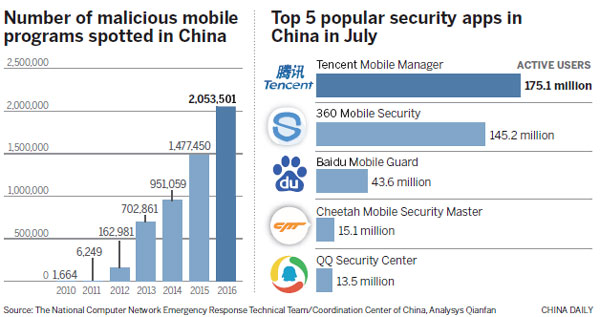Protecting driverless cars from cyberattacks

Can driverless, internet-anchored, computer-driven cars get cyber-attacked, go berserk and jeopardize the auto industry?
The Fate of the Furious opens with a scene showing unattended cars getting hacked by anarchist Cipher and then rolling off New York high-rises, creating chaos. Reality could well mimic fiction, experts said.
The Beijing Municipal Commission of Transport predicted that the market size of China's smart internet-connected vehicle industry will exceed 100 billion yuan ($15 billion) by 2020.
"We're entering a Big Security Era. Cybersecurity is no longer only about the internet. It's about almost every aspect of the offline world, and is thus an important part of national security," said Zhou Hongyi, chairman and CEO of Qihoo 360 Technology Co, China's biggest internet security company.
Agreed Zhang Zhiyong, founder and CEO of Wenfeng Automobile Consultancy. He said just like smartphones and personal computers, it is possible for a fleet of vehicles to get hacked at the same time.
"A number of autonomous vehicles used in a ride-sharing service would all run on the same system, receiving regular software updates. Through a process known as "subversion", a hacker or another organization could interfere with the update process and add in code that allows for remote access," Zhang said.
According to Zhou, automobiles could well be one of the next major targets of cyberattacks. To prepare for any such eventuality, Qihoo 360 unveiled a "security car" by partnering with WM Motor, an emerging e-carmarker, last month at the annual Cybersecurity Week, an event aimed at raising awareness of knowledge and policies related to cybersecurity.
The car is equipped with a whole set of security solutions that cover components, systems and chips.
The system can detect cyberattacks almost in real time, predict risks of being hacked by calculating existing data, and deliver repair codes to cars.
"In future, people can manage their vehicles in the same way they deal with computers," said Liu Jianhao, who is in charge of the internet-connected automobile security lab at Qihoo 360.
According to him, the Beijing-based company is offering both in-car and cloud-based solutions to better deal with cybersecurity issues.
At the cybersecurity event, Qihoo 360 also unveiled a slate of smart transportation solutions by ensuring safety among vehicle-to-human communication and interaction.
According to Zhang, a cyberattacker may slowly creep into software systems until the point of attack and taking control.
Qihoo predicts that by 2020, about 60 percent of automobiles will be connected to the internet, with vehicles becoming the third-largest segment connecting consumers with online services.

- 1 dead, 13 missing after midsize bus goes missing in north China
- Five dead in landslide in Southwest China
- Nation boosts global AI governance
- Former nuclear base keeps pioneering spirit alive
- China activates emergency response for flood control in Beijing
- China expands low-orbit internet network with new launch




































